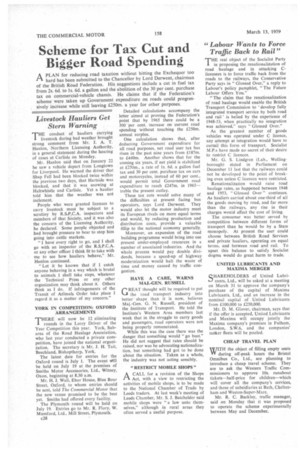"Labour Wants to Force Traffic Back to Rail"
Page 66

If you've noticed an error in this article please click here to report it so we can fix it.
THE real object of the Socialist Party in proposing the renationalization of road haulage and in attacking C
licensees is to force traffic back from the roads to the railways, the Conservative Party says in "Glossed Over," a reply to Labour's policy pamphlet, "The Future Labour Offers You."
"The claim that the renationalization of road haulage would enable the British Transport Commission to develop fully integrated transport service by both road and rail' is belied by the experience of 1948-53, when practically no integration was achieved," says "Glossed Over."
As the greatest number of goods vehicles was operated under C licence, any attempt at integration would have to curtail this form of transport. Socialist M.P.s have made no secret of their desire to restrict C licences.
Mr. G. S. Lindgren (Lab., Welling borough) stated in Parliament on December Il last that the railways could not be developed to the point of break ing even unless C licences were restricted. Renationalization would raise road haulage rates, as happened between 1948 and 1953, "Glossed Over" continues. As hauliers carried about one-third of all the goods moving by road, and far more than the railways, any rise in their charges would affect the cost of living.
The consumer was better served by competition between different forms of
transport than he would be by a State
monopoly. At present the user could choose between British Road Services and private hauliers, operating on equal terms, and between road and rail. To upset this balance to satisfy Socialist dogma would do great harm to trade.




















































































































































































